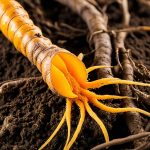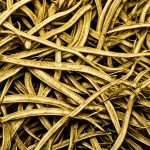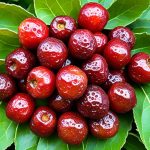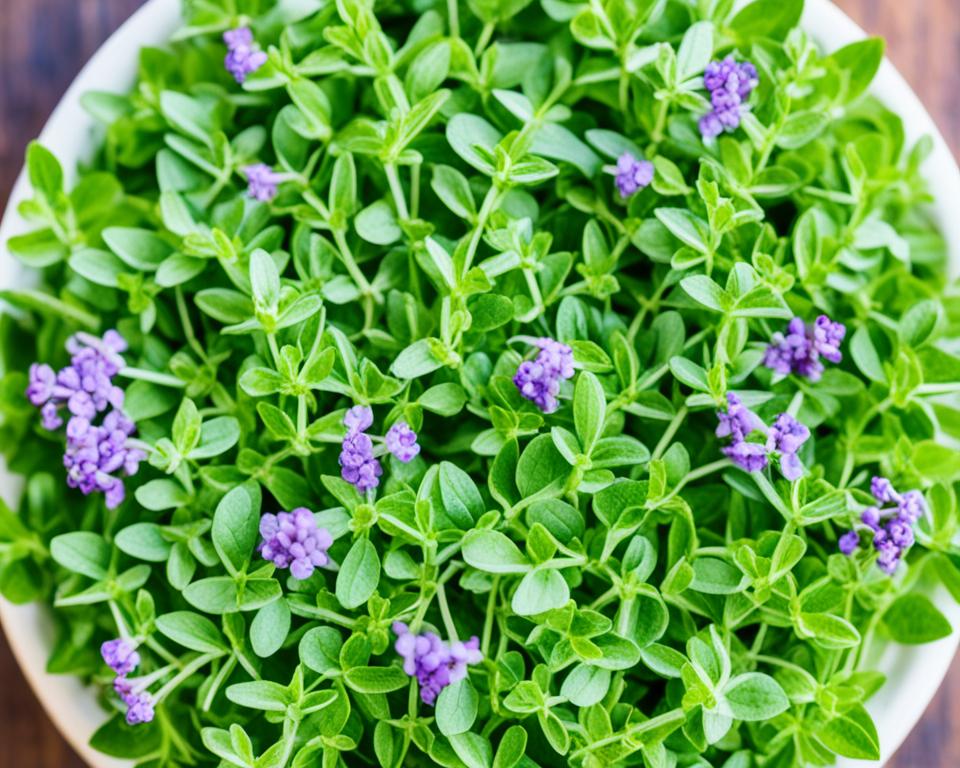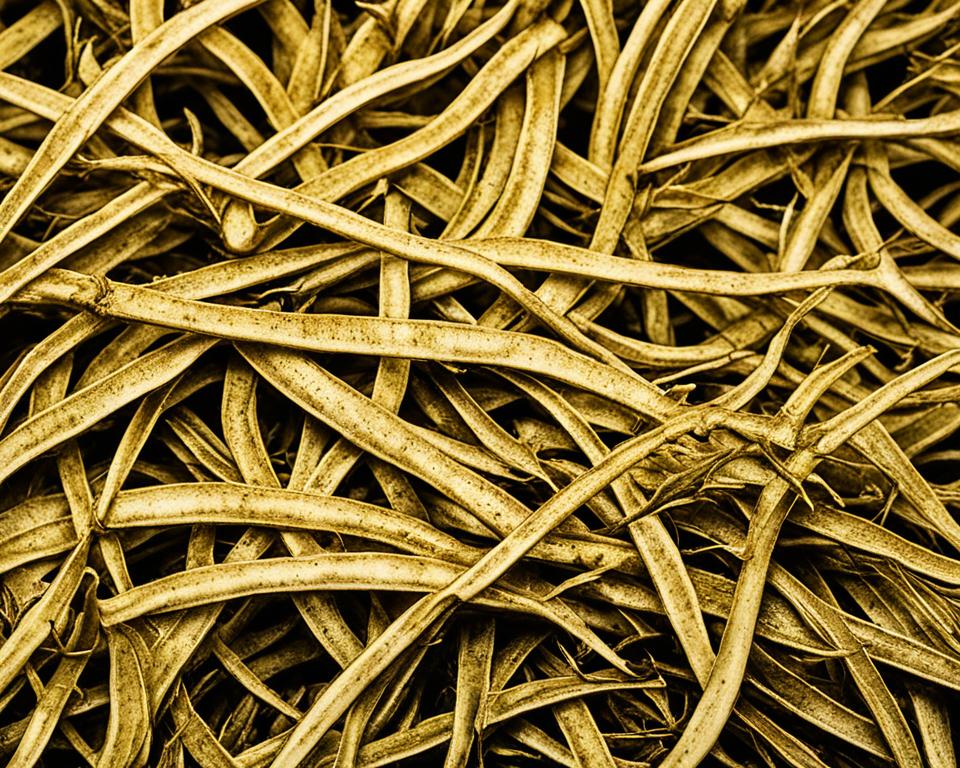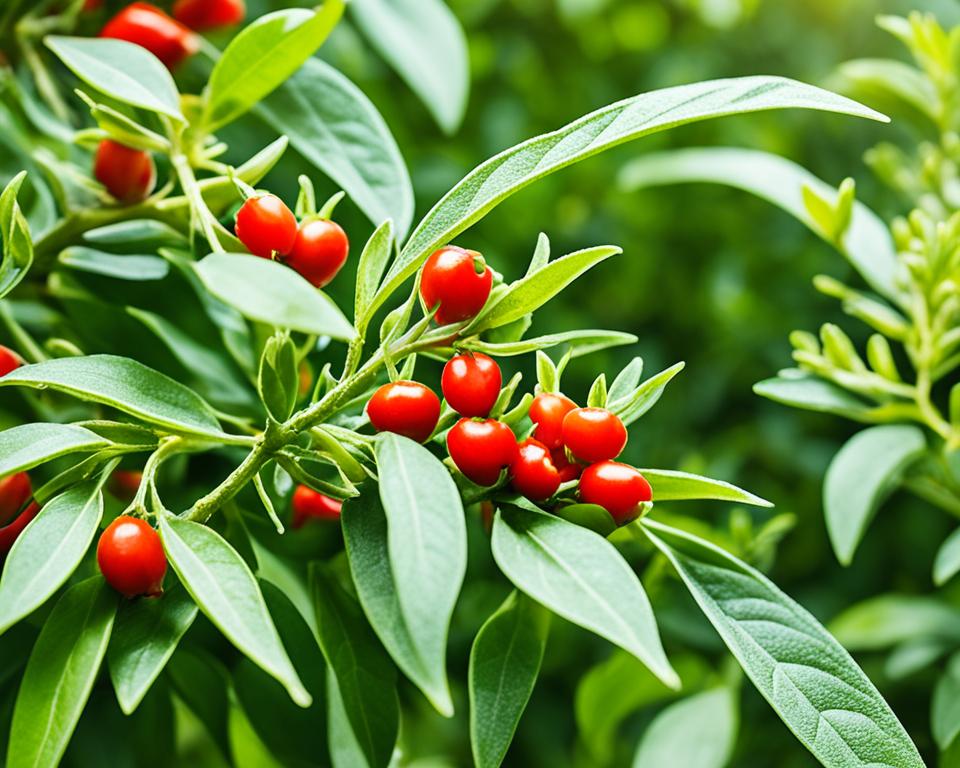Organic oregano is a fragrant and versatile herb that has been a staple in Mediterranean cuisine for centuries. This article explores the rich, earthy flavor and numerous health benefits of this potent plant, which is packed with antioxidants and essential nutrients. Readers will discover the origins and varieties of organic oregano, its culinary applications, and how to incorporate it into their everyday lives, from growing it at home to using it in supplements and beauty products. Whether you’re a seasoned cook or just looking to add more flavor and nutrition to your diet, this guide will provide you with a comprehensive understanding of the wonders of organic oregano.
Read interesting things at : tosawakan
Key Takeaways
- Organic oregano is a flavorful and nutritious herb with a long history in Mediterranean cuisine.
- The herb is rich in antioxidants and offers numerous health benefits, including anti-inflammatory and digestive properties.
- Organic oregano can be used in a variety of culinary applications, from classic Mediterranean dishes to creative new recipes.
- Incorporating organic oregano into your daily life can be done through growing it at home, using it in supplements, or including it in beauty products.
- Understanding the differences between organic and conventional oregano is important for making informed purchasing decisions.
What is Organic Oregano?
Organic oregano refers to the herb Origanum vulgare, which is grown without the use of synthetic pesticides, fertilizers, or other chemicals. This perennial plant is native to the Mediterranean region and is a member of the mint family. It has small, green leaves and pink or white flowers, and is known for its distinctive, aromatic flavor that has made it a staple in Mediterranean herb and natural spice cuisine for centuries.
Defining Organic Oregano
The term “organic” in the context of organic oregano means that the herb is cultivated using sustainable, environmentally-friendly farming practices that avoid the use of synthetic chemicals. This ensures that the final product is free from harmful residues and preserves the natural integrity of the plant.
Origins and Varieties
Organic oregano is primarily grown in the Mediterranean region, particularly in countries like Greece, Italy, and Turkey, where the warm, dry climate provides the ideal conditions for the herb to thrive. While the most common variety is the Origanum vulgare species, there are also several other oregano subspecies and cultivars, each with its own unique flavor profile and aromatic qualities.
Health Benefits of Organic Oregano
Organic oregano is a powerhouse of health benefits, thanks to its rich concentration of antioxidants, anti-inflammatory compounds, and other beneficial nutrients. The herb is particularly high in phenolic compounds, such as thymol and carvacrol, which have been shown to possess potent antioxidant properties, helping to neutralize harmful free radicals and protect the body against oxidative stress.
Rich in Antioxidants
The antioxidants found in organic oregano, including rosmarinic acid, quercetin, and luteolin, play a crucial role in supporting overall health. These compounds work to scavenge and neutralize harmful free radicals, reducing the risk of chronic diseases and supporting the body’s natural defense systems.
Anti-Inflammatory Properties
Organic oregano is also rich in anti-inflammatory compounds, such as carvacrol and thymol, which have been shown to inhibit the production of inflammatory mediators like prostaglandins and leukotrienes. This makes the herb a valuable natural option for addressing inflammation-related conditions, including joint pain, arthritis, and respiratory issues.
Aids Digestion
The volatile oils and other bioactive compounds in organic oregano have also been found to support digestive health. The herb’s antimicrobial properties can help to maintain a healthy gut microbiome, while its carminative effects can alleviate issues like bloating, gas, and occasional indigestion.
Organic Oregano in the Kitchen
Organic oregano is a staple ingredient in many traditional Mediterranean cuisine dishes, from Italian pizza and pasta to Greek salads and roasted vegetables. Its bold, fragrant flavor pairs exceptionally well with tomatoes, garlic, olive oil, and other Mediterranean ingredients, making it a key component in a wide variety of savory recipes.
Mediterranean Cuisine Staple
The pungent and slightly peppery taste of organic oregano is a defining flavor in many classic Mediterranean dishes. It is an essential ingredient in Italian sauces, such as marinara and pesto, as well as in Greek dishes like Mediterranean salad, spanakopita, and roasted lamb. The herb’s ability to enhance the natural sweetness of tomatoes and the richness of olive oil makes it a versatile and indispensable addition to the Mediterranean culinary repertoire.
Versatile Culinary Uses
Beyond its prominence in Mediterranean cuisine, organic oregano can be used to add depth and complexity to a wide range of savory dishes. The herb pairs well with meats, seafood, vegetables, and even baked goods, making it a valuable tool for home cooks and professional chefs alike. From sprinkling it over roasted potatoes to infusing it into creamy dips and dressings, the possibilities for incorporating organic oregano into your culinary creations are endless.
Growing Organic Oregano at Home
For those interested in having a steady supply of fresh, organic oregano on hand, growing the herb at home is a rewarding and relatively straightforward endeavor. Organic oregano thrives in well-drained, sunny locations and can be planted from seed or started from cuttings. It’s essential to provide the plants with adequate water and to prune them regularly to encourage bushy growth and prevent flowering, which can lead to a loss of flavor.
Planting and Care Tips
When it comes to planting organic oregano, the key is to choose a location that receives at least six hours of direct sunlight per day. The herb prefers well-draining, nutrient-rich soil and can be grown in garden beds, raised planters, or even large containers. Oregano seeds should be sown about an inch deep and spaced a few inches apart, while cuttings can be transplanted directly into the soil.
Once established, growing oregano at home requires regular watering, especially during dry spells. It’s important to avoid overwatering, as the plants can be prone to root rot. Pruning the plants regularly, by snipping off the flower heads and trimming back any overgrown foliage, will help to maintain a compact, bushy habit and preserve the herb’s flavorful leaves.
Pest Management Strategies
While organic oregano is generally a hardy and low-maintenance herb, it can occasionally fall victim to pests such as aphids, spider mites, and the occasional fungal disease. To keep these issues at bay, it’s recommended to practice organic gardening methods, such as introducing beneficial insects, using neem oil or insecticidal soap, and maintaining good air circulation around the plants.
By following these home gardening tips, you can enjoy a bountiful harvest of fresh, flavorful organic oregano right from your own backyard or balcony. With a little care and attention, this versatile herb can thrive in a variety of growing conditions, providing you with a steady supply of this aromatic, health-promoting plant.
Organic Oregano Essential Oil
Organic oregano essential oil is a highly potent and versatile product derived from the steam distillation of the leaves and flowers of the organic oregano plant. This aromatic and concentrated oil is prized for its numerous therapeutic benefits, making it a valuable addition to natural health and wellness regimens.
Production and Quality
The quality of organic oregano essential oil is largely dependent on the growing conditions, harvesting methods, and distillation process employed. Organic, sustainably sourced oils typically offer the highest purity and potency, as they are free from synthetic chemicals and processed using gentle, time-honored techniques. The oil’s composition and therapeutic properties can vary depending on the specific oregano variety and the region where it was cultivated.
Therapeutic Applications
The remarkable therapeutic benefits of organic oregano essential oil are attributed to its rich concentration of active compounds, such as thymol and carvacrol. These natural compounds possess potent antimicrobial, antioxidant, and anti-inflammatory properties, making the oil a valuable tool for supporting overall health and wellness. Organic oregano essential oil has been traditionally used in a variety of applications, including respiratory support, skin and hair care, and digestive health management.
Organic Oregano Nutrition Facts
Organic oregano is a nutrient-dense herb that is packed with a variety of essential vitamins, minerals, and antioxidants. A single tablespoon of dried organic oregano contains:
| Nutrient | Amount per Tablespoon |
|---|---|
| Calories | 11 |
| Total Fat | 0.8 g |
| Carbohydrates | 2.5 g |
| Fiber | 1.8 g |
| Protein | 0.8 g |
| Vitamin K | 14.2 mcg |
| Vitamin A | 161 IU |
| Vitamin C | 1.7 mg |
| Iron | 0.8 mg |
| Calcium | 17 mg |
In addition to these essential nutrients, organic oregano is also rich in antioxidants, including thymol and carvacrol, which contribute to its impressive nutritional profile.
Organic Oregano for Pets
Organic oregano can also be beneficial for the health and well-being of our furry friends. The herb’s antimicrobial and anti-inflammatory properties make it useful for supporting the digestive and respiratory systems of both dogs and cats. Some pet owners have found that incorporating organic oregano into their pets’ diets can help alleviate issues such as bad breath, skin irritations, and minor infections.
Benefits for Dogs and Cats
The antimicrobial properties of organic oregano can help maintain a healthy gut flora, which is essential for proper digestion and nutrient absorption in pets. Additionally, the herb’s anti-inflammatory compounds can soothe irritated skin and promote healthy respiratory function, making it a valuable addition to a pet’s overall wellness regimen.
Safe Usage Guidelines
When incorporating organic oregano into a pet’s diet, it’s important to follow safe usage guidelines. The herb should be introduced gradually and in moderation, as large doses can potentially cause gastrointestinal upset. It’s also crucial to ensure that the oregano is of high quality and free from any synthetic additives or contaminants. Consulting with a veterinarian is recommended to determine the appropriate dosage and application for your furry companion.
Organic Oregano in Supplements
In addition to its culinary applications, organic oregano is also widely available in the form of dietary supplements, such as capsules, tinctures, and extracts. These products are often promoted for their potential health benefits, including their antioxidant, anti-inflammatory, and antimicrobial properties. Consumers looking to incorporate the benefits of organic oregano into their daily regimen can explore a variety of supplement options to find the one that best suits their needs.
Capsules and Extracts
Organic oregano supplements are commonly found in the form of capsules, which allow for a concentrated dose of the herb’s active compounds. Additionally, organic oregano extracts, often in the form of tinctures or liquid supplements, provide a versatile and convenient way to reap the benefits of this potent herb. These extracts may offer enhanced bioavailability and potency compared to dried oregano powder or whole leaf supplements.
Dosage and Safety Considerations
When it comes to incorporating organic oregano supplements into one’s routine, it is important to follow the recommended dosage guidelines provided by the manufacturer. Factors such as the specific extract or form of the supplement, individual health needs, and any existing medical conditions should all be taken into account. As with any dietary supplement, it is always advisable to consult with a healthcare professional before beginning a new regimen, especially for individuals with pre-existing health concerns or who are taking medications.
Storing Organic Oregano
Proper storage is essential for maintaining the flavor, aroma, and potency of organic oregano. Fresh, whole oregano leaves should be stored in an airtight container in the refrigerator, where they can remain fresh for up to a week. To preserve the organic oregano for longer periods, it can be dried and stored in a cool, dark place, such as a pantry or spice cabinet.
Preserving Freshness
When it comes to storing fresh organic oregano, the key is to minimize exposure to air, light, and moisture. An airtight container, such as a glass jar or resealable plastic bag, will help retain the herb’s essential oils and prevent it from wilting or losing its vibrant green color. Additionally, keeping the organic oregano in the refrigerator can extend its shelf life by several days.
Optimal Storage Conditions
For long-term storage and preservation of organic oregano, drying the herb is an excellent option. Simply wash the leaves, pat them dry, and spread them out on a clean, dry surface. Once the organic oregano is thoroughly dried, it can be stored in an airtight container in a cool, dark place, such as a pantry or spice cabinet. This method will help the herb retain its potent flavor and aroma for several months.
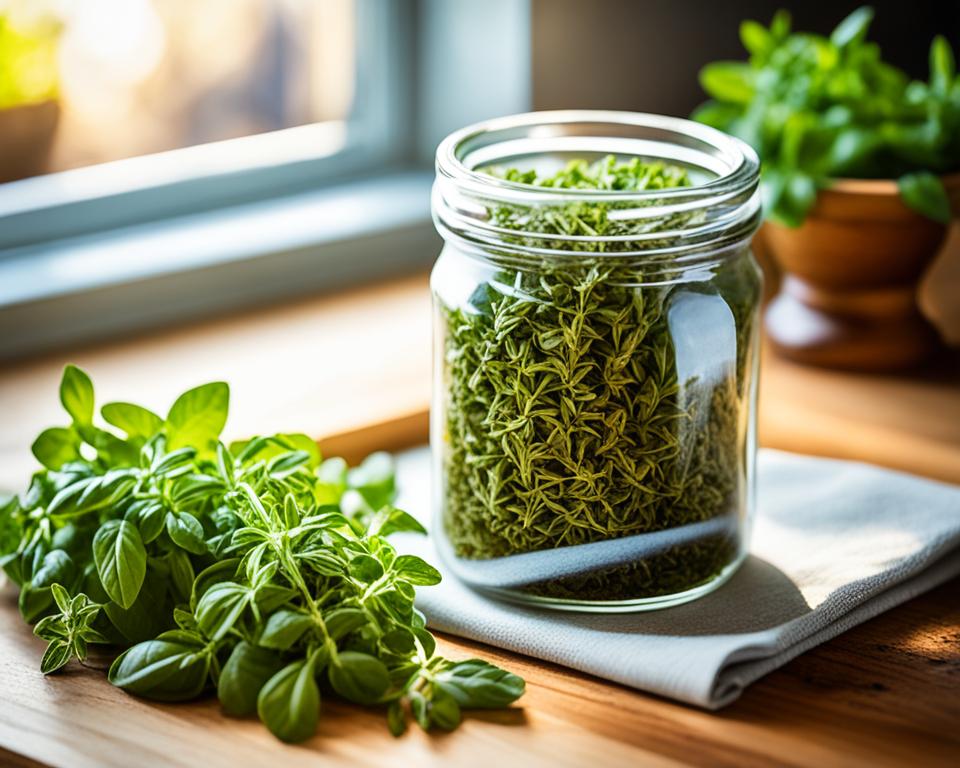
Organic Oregano in Beauty Products
In addition to its culinary and health-related applications, organic oregano has also found a place in the world of natural beauty and personal care products. The herb’s potent antimicrobial and anti-inflammatory properties make it a useful ingredient in a variety of haircare and skincare formulations.
Haircare and Skincare Uses
Organic oregano is prized for its ability to promote healthy, vibrant hair and skin. The herb’s active compounds, such as carvacrol and thymol, possess powerful antimicrobial and anti-inflammatory properties, making it an ideal ingredient for addressing a range of common hair and skin concerns.
In haircare products, organic oregano can be found in shampoos, conditioners, and hair treatments, where it helps to soothe scalp irritation, reduce dandruff, and promote healthy hair growth. The herb’s natural antimicrobial properties also make it effective in combating issues like fungal infections and bacterial buildup on the scalp.
For skincare, organic oregano is often incorporated into cleansers, toners, and moisturizers, where it can help to reduce inflammation, improve skin barrier function, and even address conditions like acne and eczema. The herb’s antioxidant properties also make it a valuable addition to anti-aging formulations, helping to protect the skin from environmental stressors and free radical damage.
Overall, the versatile and nourishing properties of organic oregano make it a compelling ingredient in a wide range of natural beauty products, from haircare to skincare. As consumers continue to seek out more sustainable and effective personal care solutions, the presence of this remarkable herb in the beauty industry is likely to continue growing.
Organic Oregano vs. Conventional Oregano
When it comes to the cultivation and production of oregano, there are distinct differences between the organic and conventional varieties, particularly in terms of their environmental impact and overall quality and flavor.
Environmental Impact
Organic oregano is grown using sustainable, eco-friendly farming practices that prioritize the health of the soil, the surrounding ecosystem, and the well-being of the workers involved. Unlike conventional oregano, which often relies on synthetic pesticides, fertilizers, and other chemicals, organic oregano is cultivated without the use of these harmful substances. This not only reduces the environmental pollution associated with conventional agriculture but also helps to preserve the natural biodiversity of the region.
Quality and Flavor Differences
In addition to the environmental benefits, organic oregano is also known for its superior quality and more nuanced, complex flavor profile. The absence of synthetic chemicals allows the organic oregano to fully develop its natural aromatic compounds, resulting in a richer, more authentic taste that is highly prized by chefs and home cooks alike. Conversely, conventional oregano may lack the depth of flavor and vibrancy that is characteristic of the organic variety, often sacrificing quality for increased production and cost-effectiveness.
Organic Oregano Recipes
Organic oregano is a versatile ingredient that can be incorporated into a wide range of delicious and nutritious recipes. From classic Mediterranean-inspired dishes to more creative culinary creations, this flavorful herb can elevate the taste and nutritional value of a variety of meals.
Mediterranean-Inspired Dishes
Organic oregano is a staple ingredient in many traditional Mediterranean cuisines, where it lends its bold, aromatic flavor to a range of savory dishes. Try incorporating it into a classic Greek salad, tossing it with roasted mediterranean vegetables, or sprinkling it over a hearty mediterranean-style pasta. The earthy notes of organic oregano pair exceptionally well with the rich, fruity flavors of olive oil, garlic, and tomatoes, making it a key ingredient in culinary ideas for mediterranean cuisine.
Creative Culinary Ideas
Beyond traditional mediterranean fare, organic oregano can also be used to enhance a variety of other recipes and culinary ideas. Experiment with adding it to homemade organic oregano-infused vinaigrettes or marinades, or incorporate it into baked goods like savory oregano biscuits or mediterranean-inspired flatbreads. The possibilities are endless when it comes to showcasing the versatility of this flavorful organic oregano herb.
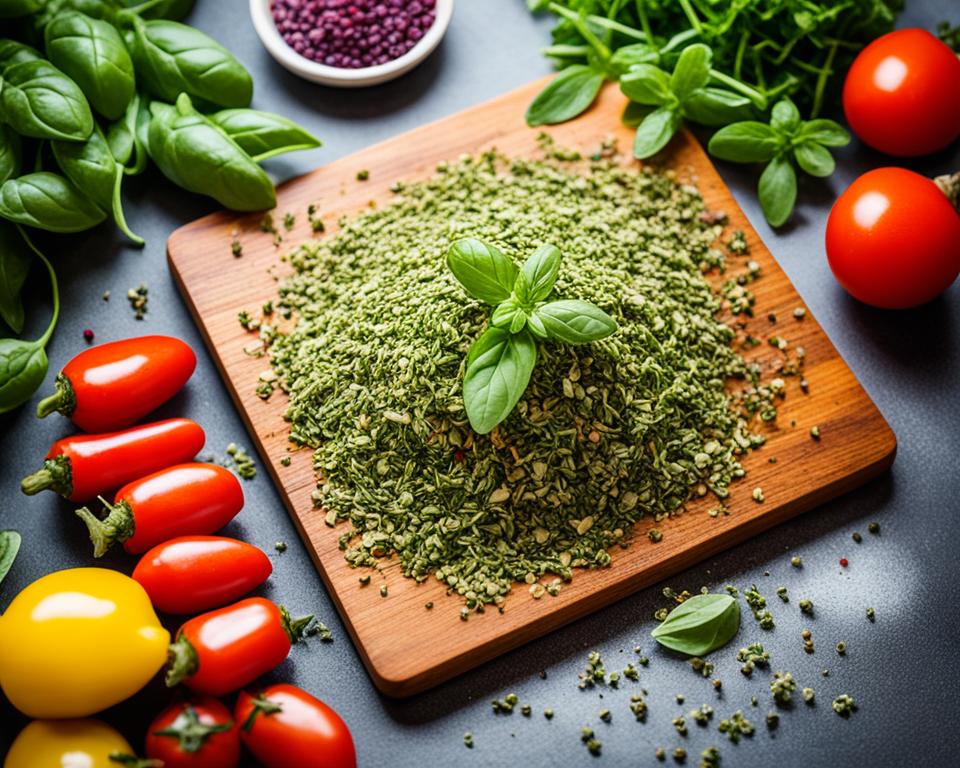
Where to Buy Organic Oregano
When it comes to purchasing high-quality, organic oregano, it’s important to seek out reputable sources and suppliers that prioritize quality, sustainability, and transparency. Organic oregano can be found in a variety of retail outlets, from specialized health food stores to mainstream supermarkets, offering a diverse range of options for health-conscious consumers.
Trusted Sources and Suppliers
For those looking to buy organic oregano, some of the most trusted sources include local farmer’s markets, online specialty retailers, and well-established organic food brands. These providers often offer robust traceability programs and detailed information about the growing and processing methods used for their oregano products, ensuring that consumers can make informed purchasing decisions.
Additionally, many natural food co-ops and health food stores feature a wide selection of organic herbs, including oregano, sourced from sustainable and ethical producers. These local businesses can be excellent resources for finding where to buy organic oregano that meets your specific needs and preferences.
When shopping for organic oregano, be sure to look for certifications and labels that indicate the product’s adherence to organic farming standards, such as the USDA Organic seal or certifications from reputable third-party organizations. This can help you identify trusted sources and ensure that you’re purchasing a high-quality, responsibly-grown product.
Cultivating Organic Oregano
For those interested in growing their own organic oregano, it’s important to understand the best practices and certification standards involved in organic farming. Organic cultivation methods prioritize the use of natural, sustainable techniques to promote soil health, minimize environmental impact, and avoid the use of synthetic chemicals.
Organic Farming Practices
Organic farmers dedicated to cultivating organic oregano employ a variety of eco-friendly techniques to ensure the health and vitality of their crops. This includes the use of compost and natural fertilizers, crop rotation, and the implementation of integrated pest management strategies that focus on biological controls and physical barriers rather than harsh pesticides. By prioritizing the long-term fertility of the soil and the overall ecosystem, organic growers are able to produce organic oregano that is not only flavorful and nutrient-dense but also environmentally responsible.
Certification Standards
In order to be labeled and sold as certified organic, organic oregano must adhere to strict regulations and guidelines established by governing bodies such as the United States Department of Agriculture (USDA) or the European Union’s organic certification program. These standards mandate the exclusive use of approved organic inputs, detailed record-keeping, and regular inspections to verify the integrity of the farming practices. By obtaining organic certification, growers can assure consumers that their organic oregano has been produced in accordance with the highest standards of environmental stewardship and quality control.
Conclusion
In conclusion, organic oregano is a truly remarkable herb that offers a wealth of benefits, from its rich, earthy flavor to its impressive nutritional profile and therapeutic properties. Whether you’re a seasoned cook or just looking to explore the world of natural health and wellness, incorporating organic oregano into your life can be a rewarding and delicious endeavor.
Throughout this comprehensive guide, we’ve explored the origins, varieties, and myriad uses of organic oregano. From its deep roots in Mediterranean cuisine to its versatile culinary applications and proven health benefits, this potent herb has demonstrated its value as a must-have ingredient for anyone seeking to enhance the flavor and nutrition of their meals. Additionally, we’ve delved into the advantages of growing organic oregano at home and the various ways it can be incorporated into beauty and wellness routines.
As you embark on your journey with organic oregano, remember to seek out high-quality, sustainably sourced products from trusted suppliers. By doing so, you can ensure that you’re not only enjoying the exceptional taste and health benefits of this remarkable herb, but also supporting ethical and environmentally responsible practices. With the wealth of information provided in this article, you’re now equipped with the knowledge to make the most of organic oregano and incorporate it into your life in a way that truly resonates with your individual needs and preferences.
